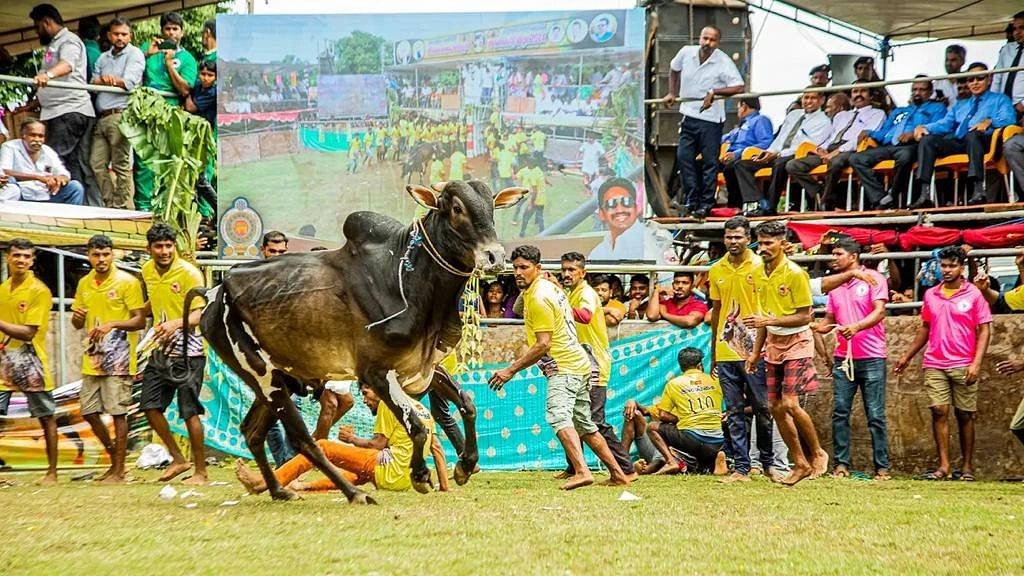
Jallikattu is one of the ancient sports played as part of Tamil harvest festival, Pongal, in major parts of Tamil Nadu.
Credit: Special Arrangement
Chennai: Pongal, the harvest festival celebrated by Tamils across the globe, came a week early this year for the people of Sri Lanka’s Eastern Province, which scripted history on Saturday by organising the first-ever Jallikattu, a bull taming sport, outside Tamil Nadu.
The event, which was organised by Eastern Province Governor Senthil Tondaman and the Tourism Bureau, saw the participation of over 200 bulls and 100 bull tamers. Hundreds of people queued up at the Sambur public playground in Trincomalee, the capital of Sri Lanka’s Eastern Province, as early as 7 am to catch a glimpse of jallikattu for the first time in person.
Thondaman flagged off the event after which a temple bull was the first to be released via the vaadivaasal into the playground as tens of young men jostled with each other to tame the bull.
Over 200 bulls decorated with flowers, including at least half a dozen raised by Tondaman’s family, were released into the ground one by one with winners returned home with plenty of prices like mixer grinders, rice cookers, and ceiling fans among other household appliances and items.
Vaadivaasal is a narrow passage from where the bulls are let into the ground to be tamed by men. Though ethnic Tamils and plantation Tamils, whose forefathers were taken from several parts of Tamil Nadu to work in coffee and tea plantations in Sri Lanka by the British, celebrate Pongal every year but jallikattu was never part of the harvest festival.
“This is the first time that the sport was conducted in Sri Lanka. Over 5,000 people participated in the jallikattu event held on Saturday,” A P Mathan, Chairman, Eastern Province Tourism Bureau, told DH over the phone.
Experts in the field from Tamil Nadu and members of the Jallikattu Protection Committee helped the organisers conduct the event in Sri Lanka, while the Animal Husbandry department ensured the bulls were fit for participation.
Jallikattu is celebrated with much fervour in several parts of Tamil Nadu, especially in Madurai, Sivaganga, and Pudukkottai districts, during the Tamil month of Thai (mid-January to mid-February).
Referred to as eru thazhuvuthal (embracing the bull) in Sangam Literature, jallikattu is deep-rooted in Tamil culture and a symbol of Tamil pride and valour. Jallikattu is derived from Tamil words salli kaasu (coins) and kattu (a package). It means those who tame the bull will get the package (prize money) that is tied to the animal’s horns.
Kalithogai, a rich Sangam Era Tamil literature dating back to 200 BCE, calls eru thazhuvuthal (embracing the bull) as a sport played in Mullai (forest) land. Historians say eru thazhuvuthal was a sport of the masses and it has a deep-rooted cultural identity.